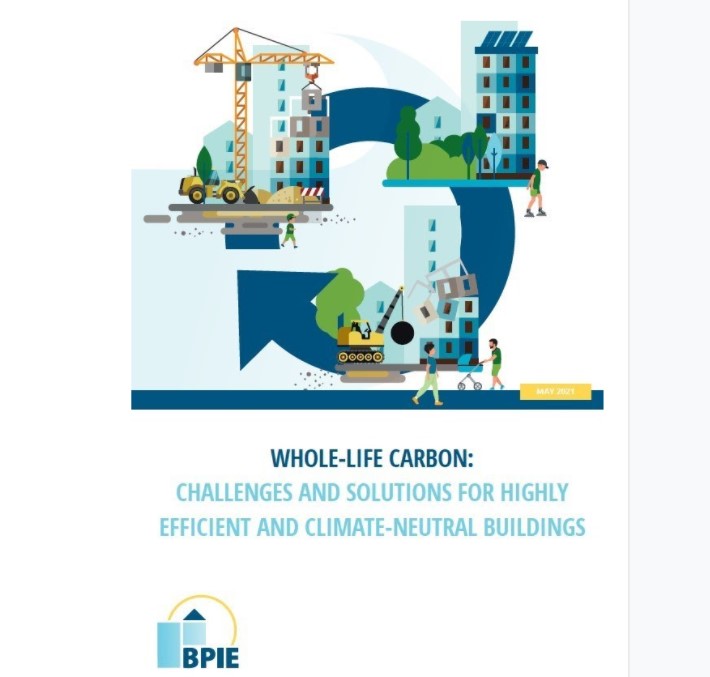BPIE report urges EU to incorporate the carbon footprint of construction into policy

|
Contents |
[edit] Introduction
Research from the Buildings Performance Institute Europe (BPIE) published in May 2021, suggests that while some European Union members have introduced comprehensive policies to reduce the carbon footprint of buildings and construction, this should now be coordinated and regulated at the European level.
The report 'Introducing whole-life carbon metrics: Recommendations for highly efficient and climate-neutral buildings', stresses how the EU's legislative changes for buildings and construction are a critical opportunity to create policy and investment certainty about carbon performance rules.
[edit] EU environmental goals
The EU aims to be climate neutral by 2050, requiring a fundamental transformation of the construction industry. Direct building CO2 emissions need to more than halve by 2030 to be on track for the 2050 target.
In its Renovation Wave strategy, the European Commission announced its intention to introduce a '2050 whole life-cycle performance roadmap' to reduce carbon emissions from buildings' by 2023.
Oliver Rapf, Executive Director of BPIE said,"For new buildings built to the highest energy efficiency standards, the low operational energy demand means that embodied carbon becomes the most significant source of carbon emissions over the building's lifetime.”
Embodied carbon emissions are associated with energy consumption and chemical processes during raw material extraction, manufacture, transportation, assembly, replacement, construction, demolition and disposal, accounting for approximately 10% to 20% of EU buildings' CO2 footprint.
To address this, BPIE suggests a common EU approach to whole-life carbon (WLC) emissions. This will require better coordination across policy measures addressing and affecting the different stages of the construction value chain.
[edit] Recalibrating targets
In the report, the BPIE finds that the introduction of a '2050 whole life-cycle performance roadmap', scheduled for 2023, is out of sync with the current legislative review process.
Rapf said, "Policy action taken by a number of EU member states demonstrates that whole-life carbon policies are possible and desirable. The European Commission should reflect this in its forthcoming proposals in 2021 (for example of the Energy Performance of Buildings Directive and the Energy Efficiency Directive), to make sure that we don't lose time in the fight against climate change".
[edit] Related articles on Designing Buildings
- Buildings Performance Institute Europe BPIE.
- Carbon neutral buildings.
- Embodied carbon.
- Energy Performance of Buildings Directive.
- EU Referendum - Environmental and climate change consequences for the built environment.
- Europe.
- Net zero carbon 2050.
- New European Bauhaus.
- Renovation Wave Strategy RWS.
Featured articles and news
A case study and a warning to would-be developers
Creating four dwellings... after half a century of doing this job, why, oh why, is it so difficult?
Reform of the fire engineering profession
Fire Engineers Advisory Panel: Authoritative Statement, reactions and next steps.
Restoration and renewal of the Palace of Westminster
A complex project of cultural significance from full decant to EMI, opportunities and a potential a way forward.
Apprenticeships and the responsibility we share
Perspectives from the CIOB President as National Apprentice Week comes to a close.
The first line of defence against rain, wind and snow.
Building Safety recap January, 2026
What we missed at the end of last year, and at the start of this...
National Apprenticeship Week 2026, 9-15 Feb
Shining a light on the positive impacts for businesses, their apprentices and the wider economy alike.
Applications and benefits of acoustic flooring
From commercial to retail.
From solid to sprung and ribbed to raised.
Strengthening industry collaboration in Hong Kong
Hong Kong Institute of Construction and The Chartered Institute of Building sign Memorandum of Understanding.
A detailed description from the experts at Cornish Lime.
IHBC planning for growth with corporate plan development
Grow with the Institute by volunteering and CP25 consultation.
Connecting ambition and action for designers and specifiers.
Electrical skills gap deepens as apprenticeship starts fall despite surging demand says ECA.
Built environment bodies deepen joint action on EDI
B.E.Inclusive initiative agree next phase of joint equity, diversity and inclusion (EDI) action plan.
Recognising culture as key to sustainable economic growth
Creative UK Provocation paper: Culture as Growth Infrastructure.





















